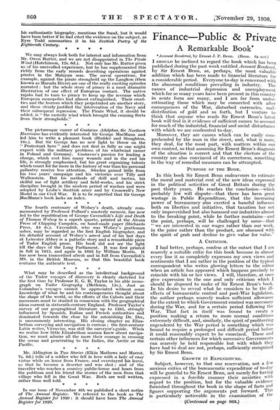What may be 'described as the 'intellectual background of the
Tudor voyages of discovery is clearly sketched for the first time by Professor E. G. R. Taylor in his able mono- graph on Tudor Geography (Methuen, 151.). Just as Columbus's voyages cannot be appreciated without some knowledge of what he and his contemporaries thought about the shape of the world, so the efforts of the Cabots and their successors must be studied in connexion with the geographical ideas current in sixteenth-century England. Professor Taylor's survey of our geographical literature up to 1583, strongly influenced by Spanish, Italian and French authorities and dominated towards the close by the astonishing Dr. Dee, is uncommonly interesting. His closing chapter on Eliza- bethan surveying and navigation is curious ; the first-century Latin writer, Vitruvius, was still the surveyor's guide. When we realize how little Elizabethan seamen knew about.naviga- tion, we must admire all the more their courage in crossing the ocean and penetrating to the Indies, the Arctic or the Pacific.
* * * *










































 Previous page
Previous page